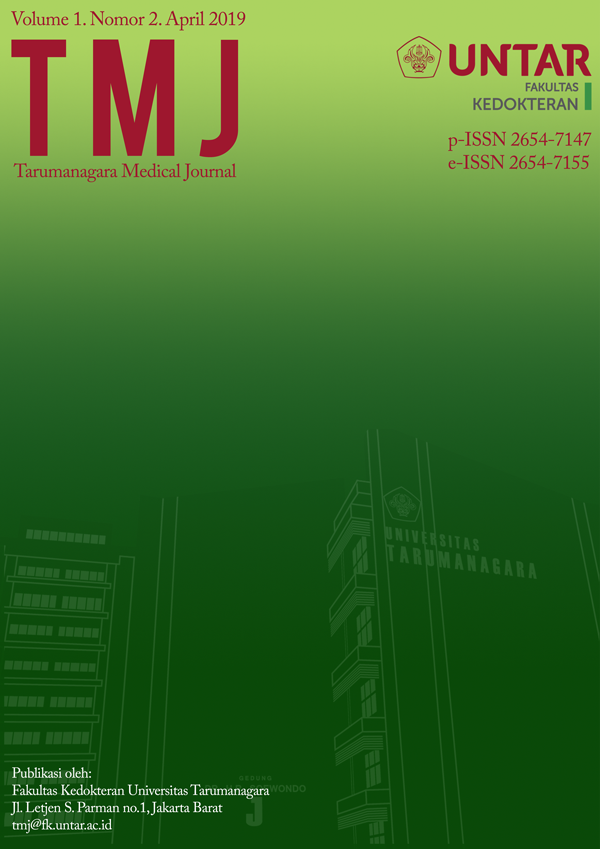Hubungan gaya belajar dengan prestasi akademik pada mahasiswa kedokteran Universitas Tarumanagara angkatan 2016
Main Article Content
Abstract
Article Details
Section
Penulis yang menerbitkan artikelnya di Tarumanagara Medical Journal (TMJ) setuju dengan ketentuan sebagai berikut:
- Penulis mempertahankan hak cipta dan memberikan jurnal hak publikasi pertama dengan bekerja secara bersamaan dilisensikan di bawah Creative Commons Attribution yang memungkinkan orang lain untuk berbagi karya dengan pengakuan atas kepengarangan dari karya asli dan publikasi dalam jurnal ini.
- Penulis dapat masuk ke dalam pengaturan kontrak tambahan yang terpisah untuk distribusi non-eksklusif jurnal versi pekerjaan yang dipublikasikan (misalnya, memposting ke repositori institusional atau menerbitkannya dalam buku), dengan pengakuan publikasi awal dalam jurnal ini.
- Setiap teks yang dikirim harus disertai dengan "Perjanjian Transfer Hak Cipta" yang dapat diunduh melalui tautan berikut: Unduh
References
McLeod S. Maslow’s Hierarchy of Needs. 2015.
Steinmayr R, Meißner A, Weidinger AF, Wirthwein L. Academic Achievement 2015. Available from:
http://www.oxfordbibliographies.com/view/document/obo-9780199756810/obo-9780199756810-0108.xml.
Essays U. Why Is Academic Success Important Education Essay [Internet] November 2013 [8 November 2016]. Available from:
Kadir MB, editor The Relationship between Students’ Learning Style and Academic Performance in Mara Professional College, Malaysia. The Asian Conference on Education 2013; 2013.
Abdul KO, Yusliza MY, Muhammad IH, Mohd ZA. The Influence of Psychological Adjustment on Academic Performance of International Students: The Moderating Role of Social Support. Aust J Basic & Appl Sci. 2014;8(2):272-83.
Magdalena SM. The Relationship of Learning Styles, Learning Behaviour and Learning Outcomes at the Romanian Students. Procedia-Social and Behavioral Sciences. 2015 May 5;180:1667-72.
Hoffmann AF, Stover JB, Uriel F, Liporace MM. Learning Styles and Academic Achievement in College Students from Buenos Aires. International Journal of Psychological Studies. 2015;7(3):141.
Ghaffari R, Ranjbarzadeh FS, Azar EF, Hassanzadeh S, Safaei N, Golanbar P, et al. The analysis of learning styles and their relationship to academic achievement in medical students of basic sciences program. Res Dev Med Educ. 2013;2(2):73-6.
Bhatti RU, Bart WM. On the effect of learning style on scholastic achievement. Current Issues in Education. 2013;16(2).
Hosseini SM, Amery H, Emadzadeh A, Babazadeh S. Dental Students’ Educational Achievement in Relation to Their Learning Styles: A Cross-sectional Study in Iran. Global journal of health science. 2015 Sep;7(5):152.
College TC. Academic Strategies Textbook. 3rd ed2016.
S. D. An Interaction of learning and teaching styles influencing mathematic achievements of ninth-grade students: A multilevel approach. Educational Research and Reviews. 2014 Oct 10;9(19):771.
Kolb DA. Experiential learning: Experience as the source of learning and development: FT press; 2014 Dec 17.
Lawrence, William K. Learning and Personality: The Experience of Introverted Reflective Learners in a World of Extroverts: Cambridge Scholars Publishing; 2015 Aug 1.
Narayanasamy S. International Conference on Social Science and Management (ICSSM 2014): DEStech Publications, Inc; 2014 Mar 26.
ALQahtani DA, Al-Gahtani SM. Assessing learning styles of Saudi dental students using Kolb’s
Learning Style Inventory. Journal of dental education. 2014 Jun 1;78(6):927-33.
Al BuAli WH, Balaha MH, Al Muhaidab NS. Assessment of learning style in a sample of Saudi medical students. Acta Informatica Medica. 2013;21(2):83.
Yaqinuddin A. Problem-based learning as an instructional method. J Coll Physicians Surg Pak. 2013 Jan 1;23(1):83-5.
Irfan OM, Almufadi FA, Brisha AM. Effect of using 4mat method on academic achievement and attitudes toward engineering economy for undergraduate students. International Journal of Vocational and Technical Education. 2016 Jan 31;8(1):1.
D. A. Essential knowledge for personal coaches. Belgium: Edgard Adriens; 2011.
Gurpinar E, Bati H, Tetik C. Learning styles of medical students change in relation to time. Advances in physiology education. 2011 Sep 1;35(3):307-11.
Tabrizi JS, Alizadeh O, H. K. Identifying Students’ learning Styles as a Way to Promote Learning Quality. Res Dev. 2013;2(1):35-9.
Taras V, Gonzalez-Perez MA. The Palgrave Handbook of Experiential Learning in International Business2015.
Kolb AY. The Kolb learning style inventory 4.0: Guide to theory, psychometrics, research and applications. Philadelphia, PA:Hay Group. 2013 Jan.
Naqvi A, Naqvi F. A study on learning styles, gender and academic performance of post graduate management students in India. International Journal of Economics and Management Sciences. 2016;6:389.
Lawrence WK. The experience of contrasting learning styles, learning preferences, and personality types in the community college English classroom (Doctoral dissertation, Northeastern University).
Ghazivakili Z, Nia R, Panahi F, Karimi M, Gholsorkhi H, Ahmadi Z. The role of critical thinking skills and learning styles of university students in their academic performance. Journal of advances in medical education & professionalism. 2014;2(3):95-102.

